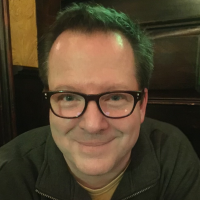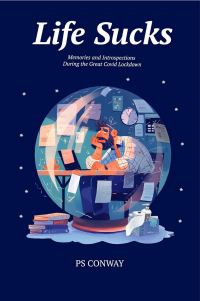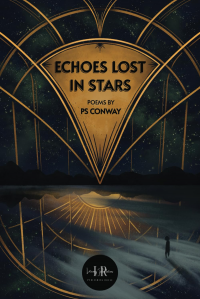PS Conway Interview Published on: 14, Aug 2024
 What first inspired you to start writing poetry, and who are some of your biggest influences?
What first inspired you to start writing poetry, and who are some of your biggest influences?
I returned to writing, and poetry more specifically, during the Covid lockdown after a 25-year life-imposed hiatus. Honestly, what inspired me to tackle poetry again (for the first time since college) was the support of the writing community on Twitter (X). But I have been a lifelong poetry reader… I like to think of myself as a New Romantic Transcendental Post-Modern Formalist (NRTPMF, if you will). Hehe. This moniker comes from the influence of John Keats, WB Yeats, TS Eliot, Carl Sandburg, Sylvia Plath, Dylan Thomas, Edna St. Vincent Millay, Edgar Allan Poe, Gertrude Stein, Anne Sexton, Pablo Neruda, Seamus Heaney, Thom Yorke, Marilyn Hacker, and Molly Peacock... to name a few.
Can you describe your creative process? How do you approach writing a new poem?I would describe my creative process as spontaneous. My Muses were locked away for a long time, and they have a lot to say now… about everything. It could be an image, or an article I am reading, or some research I may be doing, or even a single word. Bottom line, the words surge forth, and I am compelled to transcribe them. I try to frame my early mornings or late evenings as dedicated writing times. But my Muses’ insistence to be heard sometimes overrules.
Your work is described as emerging from "dark, literate, and emotive places." Can you elaborate on these themes and how they manifest in your poetry?In terms of “dark and emotive,” I am drawn to darker themes as they seem to carry greater emotional resonance for me. Loss, loneliness, longing. My poem “blue canoe” from my new poetry book, “Echoes Lost in Stars,” (sorry for the shameless plug) captures these darker, emotive themes. While on a lakeside walk, I come across an “abandoned battered blue canoe…beached and bereft.” I see it as if it was my soul and realize “we jilted things did not belong.” Sad poem. One of my faves. In terms of “literate,” I am obsessed with literature, mythology, religion; and I try to incorporate allusions, metaphors, and symbols into a lot of my writing. I really enjoy reading meaty, academic poetry. It scratches a very primal itch within me to ensure my poetry speaks to both the head and the heart. My poem “the birds are all dead” alludes to Shakespeare’s Romeo & Juliet (Act 3, Scene 5) with the lines “to recall a kiss midst birdsong / where time was lost to un-knowing / a nightingale from a lark.” It makes me smile every time I read that stanza.
What inspired the title of your first poetry collection, "Echoes Lost in Stars," and what central themes or messages do you hope readers take away from it?The title of the book is also the title of the final poem in the book., “echoes lost in stars.” The narrator contemplates the loss of a lifelong love, sitting on a park bench under a starry night sky and concludes, “…park bench in the dark of night, nothing here / of our Life except / echoes lost in stars.” That line breaks my heart. As I age, the thought of losing my wife of 30 years (this October), my daughters, heck, even my dog… is a gut-punch of emotion for me. But, while I have spoken to some darker themes so far in this interview, I want the readers to know two things: 1. I do write plenty of romantic and hopeful poetry (not all dark, LOL); and 2. “Echoes Lost in Stars” was written to evoke the spectrum of deep feelings poetry can evoke. It is arranged into 4 sections to support that idea. Quoting from the Introduction, “From sun to sunset; from starlight to stars. Light transitioning to dark. Then turning those ideas on their head to reveal those incongruous and complex feelings assumed by those metaphors. And let’s be honest. Can we truly appreciate the light without first understanding darkness?”
Having your poems featured in over 15 anthologies, how do you choose which pieces to submit, and how does the process differ from submitting to journals?I think I view journals and anthologies rather similarly in my submission selection process. It is all about three criteria that resonate with me. First, the poem has to say something substantive. Second, the poem has to speak to both my head and my heart in equal measure. Third, the poem has to sustain the lyrical quality that I believe most of my best poems contain… a distinctive and tasty mouthfeel in addition to the delicious ear candy of euphony.
Congratulations on your recent Pushcart Prize nomination! How does it feel to be recognized in this way, and what impact do you think it will have on your career?Thank you. I need to update my bios and CV soon. I can actually now say I have been nominated for 2 Pushcart Prizes. The first Pushcart Prize nomination was around August 2023 by my Editor-in-Chief (Jack Rochester) at The Fictional Café for the poem “coddled by mountains.” The second will come from my publisher of “Echoes Lost in Stars” (Literary Revelations Publishing House). She is nominating my poem “time and laundry” before the October deadline in 2024. To be honest, I am utterly gobsmacked by these honors. I truly believe most writers have a sense of Impostor Syndrome that wells-up from the insecurity caused by sharing the intimacy of your words with a world of total strangers. It really plays with your sense of self-worth and talent. And I am truly unsure how these nominations will impact my writing career. They can’t hurt! But for now, I am just truly honored and humbled to have received them.
What are your plans and goals as the 2024-25 Poet-in-Residence for The Fictional Café?As The Fictional Café’s Poet-in-Residence, I want to accomplish (primarily) two things: 1. Experiment with my poetry and showcase these evolutions and transitions through this online literary journal; and 2. Recruit new, undiscovered or emerging poetry talent to give their work a larger forum for exposure. Heck, hopefully recruit my backfill at the end of 2025, too.
One of your works became an Amazon Best Seller. How did it feel to achieve this milestone, and what do you attribute its success to?Speaking of updating my bio, actually, now two of the anthologies I have contributed to have become Amazon Best Sellers – “Hidden in Childhood: A Poetry Anthology” and “Petals of Haiku: An Anthology” have both achieved Amazon top-selling status for their categories. Both were published by Literary Revelations Publishing House. This is a fantastic indie press to work with – our publisher and editor (also for “Echoes Lost in Stars”) is a truly gifted poet herself. Her name is Gabriela Marie Milton, and she receives so many poetry submissions for her anthologies, she can truly pick the best of the best.
How has your experience been working with Literary Revelations Publishing House for your poetry collection?I have nothing but unequivocal praise for my experience with Literary Revelations Publishing House. As said earlier, when you know your publisher has such a keen ear for good poetry, you feel blessed to be selected by her and work with her. Her press’s indie status allows her to truly dedicate time, resources, and energy into your book. Especially the initial promotion. Our sales of “Echoes Lost in Stars” exploded over the first few days of release on Amazon in March. We were able to achieve “Top-Selling New Release” status in several poetry categories, twice in the first three weeks of sale.
How has your writing evolved over the years, and what changes or growth are you most proud of?Since it has been only the last 4 years I have been actively writing, I am trying to figure out some sort of objective way to evaluate how my writing has evolved. Subjectively speaking? I proudly believe I write with greater intention, focus, and precision. I am better at keeping my word choices more thematically-focused and intentional. I know I am more focused on the “smallness” of my poetry – writing vignettes that are very precise as opposed to some of my original works that were quite grandiose and broad in their reach. You can convey the same tone and themes by writing about a flower as you can the entire meadow.
What are some of the biggest challenges you've faced in your writing career, and how have you overcome them?The last 4 years has truly been a whirlwind for me. By last count, I have published 53 poems, not counting the 120 poems contained in “Echoes Lost in Stars.” Plus, two Pushcart Nominations? It’s crazy to me. So, honestly, the biggest challenge is keeping writing in its proper place for me. It thoroughly nourishes my soul; but, as most poets will confess, not my wallet. I still have a very demanding career that pushes writing prioritization to mornings, evenings, and weekends. And with my relentless desire to accomplish more and more with my writing, I need to manage my time very effectively to work what, in essence, has become two coterminous careers.
What advice would you give to aspiring poets who are trying to get their work published?Be relentless. You are only as serious about your writing as your actions reveal. Yoda said it perfectly, “Do or do not. There is no try.” Accept rejections as motivation – make it a chip on your shoulder to prove them wrong. If you are truly a decent writer, then the rest is utterly subjective opinion or monetary incentive. Never stop promoting yourself and build meaningful relationships with writers, agents, academics, publishers… anyone and everyone who cares for you and your work.
Do you have a favorite poem that you’ve written? If so, what makes it special to you?For me, personally, I wrote my most meaningful poem for my wife entitled “a cardinal” (also in “Echoes Lost in Stars”). When she was just 13-years-old, she found her father passed away from a heart attack on the kitchen floor one Saturday morning. She has always blamed herself for not doing more, for freezing at the horror of it all. And she has always believed her father visits her as a cardinal. So, I created a scenario in the poem, where she is staring out a snowy, winter window “lost in her thoughts / face blank jaw fixed.” She smiles when she sees “a red cardinal has nestled in the tree / stark like blood against the scrim.” It closes with, “i miss you daddy she mouths / the bird returns her gaze / holds her eyes for a soft eternity / and she knows with certainty / he misses her too.” Grabbing for a Kleenex as I write.
How do you engage with your readers, and what role does reader feedback play in your creative process?I have very active, consistent engagement with my readers. Twitter (X), Facebook, and a little bit on Instagram… but more so the first two. I have three websites: EchoesLostinStars.com to promote selling signed copies of the book, PoetrybyPS.com serves as a weekly blog to release new poetry, and PSConway.com as my new dedicated author site to update my readers on a myriad topics to do with writing. PoetrybyPS.com and its Facebook counterpart have (combined) several thousand readers who subscribe to see what I have written each week. I respond to every single comment from them. That alone consumes almost every Saturday morning. LOL
When did you join AllAuthor and what are your opinions about the website so far?After “Echoes Lost in Stars” released in March, and the initial groundswell of commercial activities dissipated to a dull(ish) roar, I was seeking every possible promotional tool at my disposal to expose more readers to my work. I have found AllAuthor to be a wonderful partner, without the insane expenses of other marketing alternatives. Much better ROI. The weekly images you create for me are FANTASTIC for promoting on social media. The monthly cover contests are a lot of fun, and I really think I should win for the beautiful work the artist we commissioned for the cover of “Echoes” delivered. And, of course, this lovely interview has been phenomenal to be a part of, too. Thanks for everything.
Share PS Conway's interview
PS Conway is a celebrated poet with over 50 poems featured in four online journals and 16 anthologies, including two Amazon Best Sellers. His debut collection, Echoes Lost in Stars, published by Literary Revelations Publishing House in March 2024, has garnered significant acclaim. His work delves into the depths of dark, literate, and emotive realms, revealing the profound beauty found in words.



